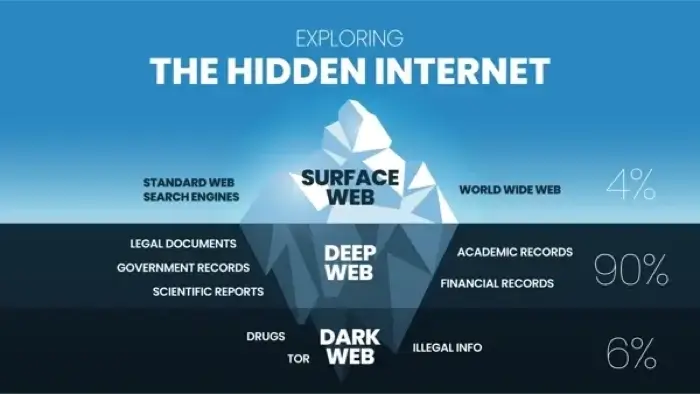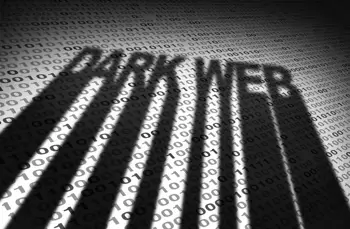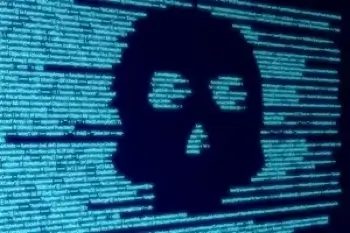What Is the Dark Web? Everything You Need to Know
We often hear about the dark web - how dangerous it is, the concerning activities that go on there, and why Internet users shouldn't access it. But what, exactly, is the dark web? In this article, learn the truth about the dangers of the dark web, how individuals can access it, and why you should proceed with caution if you do choose to explore it.
What is the dark web?
The dark web, also known as the "darknet," is a part of the Internet that is not accessible through traditional search engines or web browsers. Instead, it requires specific software, configurations, or authorization to access. Though often associated with illegal activities, some do use it for legitimate purposes.
The most well-known method for accessing the dark web is through a browser called Tor. The Tor network allows users to access websites and search results that traditional browsers, like Google, don't. The Tor project encrypts users' Internet connections and bounces them through a series of volunteer-run servers worldwide, making it difficult to trace the user's location or identify the website being accessed. However, there are still points at which a user's data could be seen, such as when information passes through a Tor exit node.

What is the deep web?
Though the two terms are often used interchangeably, the dark web is different than the deep web. The deep web refers to all the parts of the Internet that aren't indexed by search engines. These sites aren't necessarily bad; they're just not meant for the public.
The deep web includes things like online databases, private networks, government or institutional records, and password-protected websites. The deep web is much larger than the surface web, which is the web as we know it; the surface web is the part of the Internet that we can access through traditional search engines. Though we often think of the surface web as comprising most of the Internet, it actually makes up a small percentage. Deep web pages make up about 90% of the Internet as a whole.
On the other hand, the dark web is a small part of the deep web. As mentioned above, it also cannot be accessed by traditional search engines. It's primarily associated with illegal activities like trafficking or stolen information. Though they may seem similar at first, comparing the deep web vs the dark web makes the differences between them clear.
What is on the dark web?
The darknet is a diverse and constantly evolving space. Therefore, it's difficult to say exactly what it contains at any given time. However, several types of content or services consistently find a place on this platform.
Illegal marketplaces and black markets have a significant presence on the dark web. Individuals can buy and sell illegal drugs, weapons, stolen personal information like bank accounts and credit card numbers, and other illicit goods and services. Unfortunately, some individuals sell pornography, particularly child pornography. It's also home to various hacking tools and services used to gain unauthorized access to computer systems and steal sensitive information.
Additionally, it contains a great deal of terrorism-related content; some websites and forums promote or glorify terrorism and extremist ideologies. Some dedicate themselves to political dissidence, with users discussing and organizing protests, strikes, and other activities.

Many anonymous social networks exist on the dark web, providing anonymous platforms for people to communicate and share information without exposing themselves. Individuals can also access cryptocurrency-related content, as the platform is home to services such as cryptocurrency exchanges, wallets, and tumbling services.
It's important to note that this isn't a comprehensive list. You can find many other types of content on this side of the web. Furthermore, not all of the illegal activity on the dark web is related to the dark web itself. You can also find illegal activities and services on the regular web.
Legal uses of the dark web
The dark web, like any technology, works for both legal and illegal purposes. Some examples of legal uses include:
- Anonymous communication. The dark web allows for communication that can't be traced to a specific individual, which helps whistleblowers, journalists, and activists in countries with strict censorship laws.
- Privacy and security. The dark web provides a level of anonymity and security that is not available on the open web, which can be helpful for individuals who want to protect their personal information from hackers or government surveillance.
- Research. Individuals or researchers can study criminal activity and other topics that may be difficult to access through traditional means.
- File sharing. The underside of the web also works for peer-to-peer file sharing, much like the networks used in torrenting. It works for large files that are difficult to share using traditional methods.
It's important to note that while these uses may be legal, accessing the dark web itself may not be permitted in certain countries. Furthermore, no country permits accessing or possessing illegal content from the dark web.
Accessing the dark web
The dark web isn't accessible through traditional search engines or browsers like Google. Dark web sites are not indexed for the surface web; dark web websites are sites only available on the dark web. Therefore, to get to them, users must find alternative methods. You need specific software, configurations, or authorization to access it.
The most straightforward way to access the dark web is via Tor, the "Onion Router," which lets users access websites with an .onion domain. Those sites are inaccessible through regular browsers. Browsers such as Tor and DuckDuckGo, though legitimate browsers, also function as dark web browsers as they allow users to access the these restricted sites.
To access the dark web using Tor, you must first download and install the Tor browser. Once installed, you can access .onion websites by entering their address into the browser's address bar.
However, it is essential to note that not all .onion websites are legitimate; many contain illegal or malicious content.
In addition to Tor, some users gain access via virtual private networks (VPNs), proxy servers, or the I2P (Invisible Internet Project) network. However, these methods may not provide the same level of anonymity and security as Tor since Tor encrypts activity in the browser. Some individuals also use dark web search engines, like Haystak or Ahmia, to access dark or deep webpages.
Though these methods allow access, none guarantee protection, anonymity, or online privacy. The dark web is dangerous, and users who choose to access it must be aware of the risks they may face.
Threats on the dark web
Users trying to access the dark web need to prepare for the myriad of threats they could encounter when browsing. Whether the dark website you're trying to access is legitimate or not, prepare for the risks. You could:

- Encounter fraudulent services or the sale of counterfeit products. The platform hosts many illegal marketplaces, but not all products sold are authentic; be aware that any purchase you make might be fraudulent.
- Fall victim to a phishing scam. Phishing scams involve tricking victims into giving their confidential information or personal data to an untrustworthy source. Users may encounter different types of scams on the dark web, but they must watch for phishing scams especially.
- Have your information stolen or your device hacked. This part of the web hosts many cybercriminals and hackers with the knowledge to hack or harm your devices even without your knowledge.
- Download malware or ransomware. Anything downloaded from the platform comes with risk. Cybercriminals often hide malware or ransomware in attachments or downloads from this part of the web.
- Encounter surveillance from law enforcement agencies. Even on this part of the web, you aren't entirely anonymous. Law enforcement agencies sometimes identify and track individuals engaged in unlawful activities on the platform. They also perform sting operations, posing as buyers in order to shut down illegal marketplaces like Silk Road.
If you must access the dark web, do it as safely as possible by taking the precautions below.
How to stay safe on the dark web
Most professionals recommend you do not access the dark web due to its risks. However, you can take certain actions to better protect yourself if you choose to use it.
- Use a VPN. A virtual private network helps to protect your identity and location anywhere, including on the darknet. It also changes your IP address to allow access all over the web. However, ensure you use a reputable VPN service with a good track record of protecting user privacy.
- Be careful what you click. Even if you're using the darknet for legitimate means, it's full of scam, fake emails, and phishing attempts. Be careful what you click on, and never enter personal information. Make sure to protect all online accounts before accessing them on the dark web as well.
- Avoid illegal activities and be aware of your laws. In most countries, accessing or possessing unlawful content is illegal. Make sure you don't involve yourself in crimes or dangerous activity. Furthermore, ensure you know your country's laws regarding this part of the web in general; some countries have strict rules prohibiting access.
- Don't trust anyone. The dark web is anonymous, making it difficult to know who you're communicating with. Never give out personal information to other users or entities asking for it.
- Update your antivirus software. It's easy to download malware or viruses from the this side of the web, whether you mean to or not. Make sure you update your antimalware software - or install some if you don't have any - to give yourself the best chance at blocking any malware that does come through.
Remember that while the dark web can provide a level of anonymity and security, it's not entirely safe by any means. Make yourself aware of the risks involved and seriously consider them before you venture out.
Frequently asked questions
Is my info on the dark web?
If you've been a data breach victim, your information may be on the dark web. Use the data breach check tool to check if your data has been involved in any breaches. You can also use Experian's Dark Web Scan to check the dark web for any of your information.
Is it legal to access the dark web?
Depending on the country in which you live, just looking at the dark web could be illegal. However, this isn't the case for all countries, so check your country's laws. Keep in mind that involving yourself in unlawful activities anywhere online, regardless of where you live, is not legal and punishable by law.
Is it legal to buy and sell goods on the dark web?
If you're buying or selling legal goods in a legitimate way, then yes, you can do it on the dark web. However, if you're buying illegal substances, weapons, or anything not purchasable under the law, then no, it's not legal.
Is it legal to use the dark web for anonymous communication?
Yes, you can use the dark web for anonymous communication legally as long as you aren't interacting with illegal sources or sending threats of any kind.